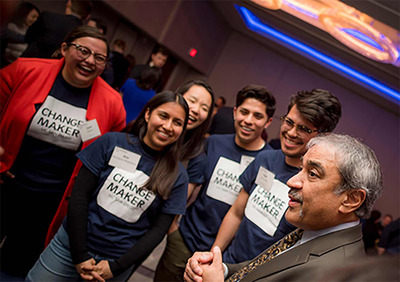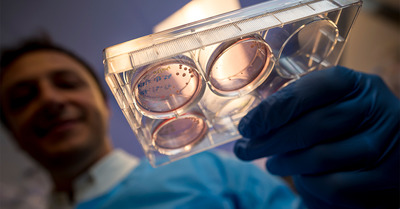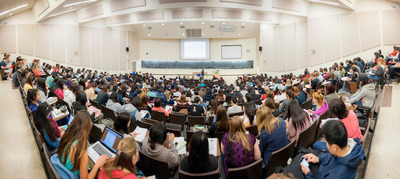UC San Diego Rises Five Spots to No. 29 in Times Higher Education World Reputation Rankings
Story by:
Published Date
Article Content
The University of California San Diego has been named the No. 29 university in the world, climbing five spots globally in the Times Higher Education World Reputation Rankings 2022.
UC San Diego also rose four places nationally to No. 17 in the United States. The university ranked No. 5 among public colleges in the country, rising one spot from last year.
The Times Higher Education World Reputation Rankings 2022 are based on the world’s largest invitation-only opinion survey of senior, published academics. The scholars are asked to name no more than 15 universities that they believe are the best for research and teaching in their field.

In the ranking’s 2022 edition, UC San Diego’s research performance scored 12.0, rising 2.2 points from 2021. Its teaching performance maintained its 7.3 score. In total, 200 schools were evaluated in the final list from Times Higher Education.
"UC San Diego continues to be recognized for our national and global reputation in research and teaching," said Chancellor Pradeep K. Khosla. "This rise in rankings is a testament to the quality of our world-renowned faculty and researchers who lead new discoveries, foster innovation and educate the next generation of changemakers at UC San Diego.”
As one of the world’s leading research-focused public universities, experts at UC San Diego consistently produce high-quality research that leads the way to new discoveries.

This month, an international team of researchers led by scientists at the UC San Diego School of Medicine and Sanford Consortium for Regenerative Medicine used human brain organoids to show how the SARS-CoV-2 virus that causes COVID-19 infects cortical neurons and specifically destroys their synapses—the connections between brain cells that allow them to communicate with each other.
Researchers at Scripps Institution of Oceanography at UC San Diego were also the first to observe the life cycle of a deep-sea octopus. The bigeye octopus, which was rescued from a line trap in La Jolla, went on to lay fertilized eggs at the Scripps Experimental Aquarium facility. This month in the journal Ecology and Evolution, the researchers outlined their observations as baby octopuses developed and hatched and witnessed the octopus’s behavior before and after she laid the eggs.

A UC San Diego research team recently announced it will be experimenting in space to study the hydrodynamics of mudslides. To better understand gravity’s effects on post-wildfire mudflow, an experiment designed by UC San Diego faculty member Ingrid Tomac will launch to the International Space Station to improve our ability to prevent mudslides after a fire here on Earth. The project is funded by the U.S. National Science Foundation and supported by Space Tango.
Further, this November, eight researchers from UC San Diego were listed in the inaugural ranking of the “1,000 Best Female Scientists in the World” by Research.com. The ranking, which seeks to celebrate and elevate the long-overlooked contributions of women in academic science, recognized the following scientists: Sonia Ancoli-Israel, Susan S. Taylor, Steffanie A. Strathdee, Marta Kutas, Susan F. Tapert, Andrea Z. LaCroix, Terry L. Jernigan and Irene Litvan. Women leading research projects at UC San Diego has risen from approximately one in five to more than one in three over the past 10 years.

Throughout campus, UC San Diego’s scholarly community combines expertise and enthusiasm to inspire learners as they pursue their academic career. The university offers more than 100 degrees and programs, ranging from literature and mathematics to politics and biology. Professors at UC San Diego are also highly regarded leaders in their respective fields.
Last week, UC San Diego music professor Anthony Davis received a 2023 Grammy nomination for Best Opera Recording. The Pulitzer-winning composer was recognized for his opera, “X — The Life And Times Of Malcolm X.” In addition, Tajana Šimunić Rosing of the UC San Diego Department of Computer Science and Engineering was also recently honored with the 2022 University Research Award for semiconductor design, making her the first woman to receive the award in its history.
Alongside this latest ranking from Times Higher Education, UC San Diego's world-class education and research is consistently recognized with many awards and accolades that can be reviewed on the university’s Campus Profile. Last month, UC San Diego was named the No. 15 university in the U.S. and No. 20 in the world, according to U.S. News & World Report’s 2022-2023 Best Global Universities. In September, UC San Diego was named the eighth best public university in the nation in the U.S. News & World Report 2022 Best Colleges ranking.
For more information on the Times Higher Education World Reputation Rankings 2022, visit the outlet’s website.
Share This:
You May Also Like
Stay in the Know
Keep up with all the latest from UC San Diego. Subscribe to the newsletter today.




